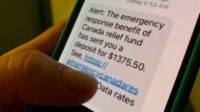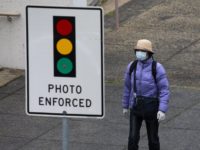Cybersecurity experts describe it as a perfect storm: employees working from home — away from their firm’s IT experts and sometimes without the protection of a corporate computer network — and hungry for information about a mysterious coronavirus. With the COVID-19 crisis as the backdrop, fraudsters appear to be redoubling their efforts to steal information or money from unsuspecting users, sending fake emails and text messages as bait, in a scheme known as phishing. In one scam, fraudsters pretend to be processing EI claims, preying on Canadians who’ve recently lost their jobs.…
Read MoreMonth: March 2020
‘Internet Is The Only Lifeline They Have’: Canada Needs To Confront ‘Digital Divide’ Amid COVID-19 Crisis | CBC Radio
The COVID-19 pandemic is forcing Canada to confront many of its hidden social inequalities, one of these being unequal access to the internet, an internet freedom advocate says. Laura Tribe, executive director of OpenMedia, says disproportionate access to the internet is often talked about in terms of only affecting the North or remote communities, however, the current public health crisis has shown the problem is just as common in many cities. “There are so many people throughout the country — even in urban areas — that don’t have the internet…
Read MoreBroadband Speeds Fall In Dozens Of Big US Cities During Pandemic | Ars Technica
Home-Internet download speeds have fallen during the COVID-19 pandemic in dozens of the biggest US cities as millions of Americans stay home due to school and business closures. However, typical download speeds remain high enough to support normal broadband-usage patterns, with the vast majority of cities still above the Federal Communications Commission’s 25Mbps standard. In 88 of the 200 most populous US cities, Internet users “experienced some degree of network degradation over the past week compared to the 10 weeks prior,” BroadbandNow said in a report released Wednesday. Of those,…
Read MoreHow Will The Coronavirus End? | The Atlantic
The U.S. may end up with the worst COVID-19 outbreak in the industrialized world. This is how it’s going to play out. Three months ago, no one knew that SARS-CoV-2 existed. Now the virus has spread to almost every country, infecting at least 446,000 people whom we know about, and many more whom we do not. It has crashed economies and broken health-care systems, filled hospitals and emptied public spaces. It has separated people from their workplaces and their friends. It has disrupted modern society on a scale that most…
Read MoreGovernments Could Track COVID-19 Lockdowns Through Social Media Posts | CNET
A research group scrapes more than 500,000 Instagram profiles in Italy to see if people abiding by the quarantine. The Italian government enforcing its nationwide lockdown measures to control the spread of the coronavirus outbreak. Your posts on social media have been harvested for advertising. They’ve been taken to build up a massive facial recognition database. Now, that same data could be used by companies and governments to help maintain quarantines during the coronavirus outbreak. Ghost Data, a research group in Italy and the US, collected more than half a…
Read MoreCoronavirus Pandemic Changes How Your Privacy Is Protected | CNET
Data protection officials around the world are loosening rules on how your data can be used during the COVID-19 outbreak. Privacy protections around the world are getting lifted during the coronavirus outbreak. As the coronavirus pandemic gets worse, privacy commissioners are lifting data restrictions for health officials to keep track of the outbreak. A review of policy changes around the world shows that data protection agencies are prioritizing lives over privacy, and it could be a sign of what’s to come for the US. In Hong Kong, the city’s privacy…
Read MoreBell, Rogers, Other Telecoms Remove Internet Data Caps Amid COVID-19 | CTV News
TORONTO — As Canadians grapple with a growing list of cancellations, closures and travel restrictions, several Canadian telecom companies are temporarily removing overage fees on home internet plans amid the ongoing COVID-19 outbreak. In a statement issued Saturday, Bell Canada, which owns CTV News, announced it will waive any additional usage fees for residential internet customers, including Bell Aliant, Bell MTS and Virgin Home Internet services, until the end of April. “Any overage fees will be waived automatically, so customers don’t need to make any changes to their accounts,” the…
Read MoreCoronavirus Exposes Digital Disparities Between Students | Digital Trends
With universities across the country closing their campuses, canceling classes, and moving everything online, the coronavirus pandemic has complicated learning for many students and faculty, despite the wide use of technology to keep classes going. Perhaps the most basic issue is what students will do when they do not have reliable high-speed internet access. The Federal Communications Commission (FCC) doesn’t have accurate data on how many millions of Americans lack broadband, but Microsoft estimates it is likely far more than the 25 million people the government agency cited in a…
Read MoreHow Apps Secretly Spy On You With Third-Party Trackers | Digital Trends
The moment you install an app, it begins scavenging and pestering you for your data. It requests permissions to tap into your phone’s internals, asks you to register a handful of personal information — you know the drill. However, no matter how frugal and vigilant you are at each step, there’s still one way most apps end up covertly mining your data. Every app comes packaged with a range of what are technically called Software Development Kits (SDK). To understand these better, think of an app as a Lego house…
Read MoreNSP Ordered To Refund Millions To Customers, But Bills Not Likely To Shrink | CBC News
Nova Scotia Power was ordered to pay a multi-million dollar refund to customers Friday by regulators who ruled a mega-project once again failed to deliver promised benefits. Ratepayers are on the hook for the $1.57-billion Maritime Link, which was completed on time and on budget in 2017 to bring electricity from the Muskrat Falls hydro project into Nova Scotia via subsea cable across the Cabot Strait. The problem is customers haven’t been getting what they paid for. The Maritime Link has not delivered any electricity from Muskrat Falls. That project…
Read More









